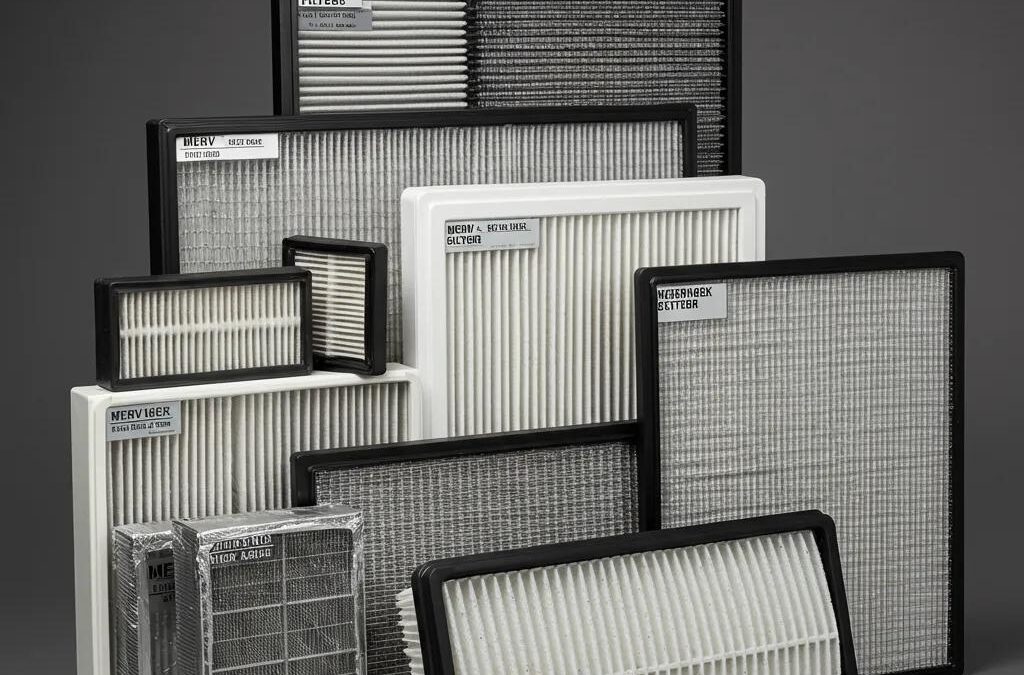Did you know the air inside your home or office can be up to five times more polluted than the air outside? This means dust, pollen, and other airborne nasties are circulating, impacting your comfort and well-being. This guide from Carpet MD will show you how choosing the right air duct filters can dramatically improve your indoor air quality, protect your HVAC system, and even help lower your energy bills. We’ll dive into why filters are so important, break down MERV ratings, compare different filter types, help you find the perfect size, and discuss replacement schedules. Plus, we’ll touch on the value of professional duct cleaning and introduce smart filter options. Get ready to discover how to achieve noticeably fresher air throughout Forest Grove, Hillsboro, Beaverton, McMinnville, Sherwood, Tigard, Banks, and North Plains, Oregon.
The Inside Story: A Guide to Indoor Air Quality
Scientific evidence from the U.S. Environmental Protection Agency indicates that indoor air within homes and buildings can be significantly more polluted than outdoor air, with concentrations of some pollutants often 2 to 5 times higher. This is particularly relevant as people spend approximately 90% of their time indoors, increasing potential health risks.
Why Are Air Duct Filters So Important for Your Home’s Air and HVAC System?
Think of air duct filters as the first line of defense for your home’s air. They’re the screens in your HVAC return vents designed to catch dust, pollen, pet dander, and all sorts of other airborne particles before they get circulated throughout your living space. By trapping this debris, filters prevent gunk from building up inside your ducts and on your furnace or air conditioner coils. This means less strain on your system, better airflow, and ultimately, a healthier environment. For instance, a MERV 8 pleated filter can snag over 70% of common household allergens, showing just how much difference the right filter can make.
How Do Air Duct Filters Keep Your HVAC System Running Smoothly and Your Air Clean?
Your HVAC system’s components, like blower motors and heat exchangers, are protected by air duct filters. These filters act as a barrier, intercepting the harmful particles that could otherwise settle on and damage these vital parts. This protective action:
- Keeps coils free from dust buildup, ensuring efficient heat transfer.
- Filters out abrasive debris, preventing wear on motor bearings.
- Limits the growth of mold and bacteria by trapping moisture-carrying particles.
By filtering the air right at the return vent, you ensure balanced and healthy airflow, which leads to fewer unexpected breakdowns and a longer lifespan for your equipment.
What Health Perks Come with Using the Right Air Filters?
Choosing the correct air filter can make a significant difference in reducing airborne allergens and irritants, leading to better respiratory health and overall comfort. By effectively trapping pollen, dust mites, and pet dander, high-efficiency filters can help minimize asthma flare-ups and allergy symptoms. For households with children or elderly family members, this reduction in triggers can mean fewer doctor visits and a greater sense of well-being.
How Do Clean Filters Affect Your Energy Use and Utility Bills?
When your air filters are clean and unobstructed, your HVAC system doesn’t have to work as hard to heat or cool your home. This means it uses less energy. Studies show that a clean filter can boost system efficiency by up to 15%, which translates directly into savings on your monthly utility bills. Regularly changing your filters helps your system run more efficiently, stabilizes indoor temperatures, and can even reduce the likelihood of costly repairs down the line.
Understanding MERV Ratings: What They Mean for Your Filter’s Performance
MERV stands for Minimum Efficiency Reporting Value, and it’s a scale from 1 to 20 that tells you how effectively a filter captures particles of different sizes. A higher MERV rating means the filter is more efficient at trapping smaller particles. MERV 1-4 filters offer basic protection, while MERV 13-16 filters get close to HEPA-level performance. Knowing this scale helps you find the right balance between clean air and ensuring your HVAC system has enough airflow.
What Does the MERV Scale Tell Us About Particle Capture?
| MERV Range | Particle Size Captured | Typical Application |
|---|---|---|
| 1–4 | 10–3 µm (lint, pollen) | Basic residential |
| 5–8 | 3–1 µm (dust mites) | Standard homes |
| 9–12 | 1–0.3 µm (mold spores) | Improved allergy control |
| 13–16 | 0.3–0.1 µm (smoke) | Severe allergy/virus protection |
| 17–20 | < 0.1 µm (viruses) | Hospital/clean rooms |
Which MERV Ratings Are Best for Homes with Allergies and Pets?
If pet dander and seasonal allergens are a concern, filters in the MERV 8 to MERV 13 range offer a great balance of filtration power and airflow. MERV 8 pleated filters are excellent at capturing over 70% of pet dander, and MERV 13 filters can trap up to 89% of mold spores and bacteria, all without putting too much strain on most home HVAC systems.
Can Higher MERV Ratings Cause Airflow Issues or Harm My HVAC System?
Yes, it’s possible. Filters with MERV 14 or higher can restrict airflow if your HVAC unit isn’t designed for such dense media. This can lead to reduced fan efficiency and even system freeze-ups. Before you upgrade to a high-MERV filter, it’s always best to check your system’s manufacturer specifications or consult with an HVAC professional at Carpet MD to ensure compatibility.
How to Pick the Right MERV Rating for Your Oregon Home or Business?
When choosing a MERV rating for your Oregon property, consider these important factors:
- The seasonal pollen levels in areas like Forest Grove and Tigard.
- Whether you have pets or family members who suffer from allergies.
- How often your HVAC system runs, especially during hot Beaverton summers.
- Your HVAC manufacturer’s recommendations for airflow.
By matching the MERV rating to your specific needs and local conditions, you can achieve cleaner air without negatively impacting your system’s performance.
Exploring Different Air Duct Filter Types and Their Advantages
Air duct filters come in various forms, each with its own construction and benefits. Understanding the differences between pleated, fiberglass, electrostatic, HEPA, activated carbon, and washable filters will help you choose the best option for your air quality goals.
A Look at Pleated, Fiberglass, and Electrostatic Filters: How Do They Stack Up?
| Filter Type | Efficiency (MERV) | Reusability | Typical Use Case | Durability |
|---|---|---|---|---|
| Fiberglass | 1–4 | Disposable | Budget-conscious, basic protection | 1–3 months |
| Pleated | 5–12 | Disposable | All-purpose residential | 3–6 months |
| Electrostatic | 6–12 | Washable | Allergy-prone homes | 6–12 months |
Why Are HEPA Filters the Top Choice for Severe Allergies and Virus Protection?
High Efficiency Particulate Air (HEPA) filters, rated MERV 17–20, are designed to capture at least 99.97% of particles as small as 0.3 µm. This exceptional level of filtration is ideal for protecting against viruses, bacteria, mold spores, and even ultrafine dust. If you’re looking for hospital-grade air purity in your home or office, HEPA filters are an excellent choice.
How Do Activated Carbon and Washable Filters Enhance Your Air Quality?
Activated carbon filters are fantastic for absorbing unwanted odors, smoke, and volatile organic compounds (VOCs) thanks to their porous carbon structure. This makes them great for kitchens or workshops where smells can linger. Washable filters, on the other hand, use electrostatic attraction to trap particles and can be rinsed clean for reuse, offering an eco-friendly and cost-effective solution over time while still providing good filtration.
Which Filter Types Work Best After Professional Air Duct Cleaning?
After a professional air duct cleaning, installing a high-quality pleated filter or one with a MERV rating of 8–11 is a smart move. These filters will continue to capture any residual dust and debris, helping to maintain the cleanliness of your newly cleaned system. If persistent odors are an issue, consider pairing duct cleaning with an activated carbon filter to keep your indoor air smelling fresh between professional cleanings.
Finding the Right Air Filter Size for Your HVAC System
Getting the correct filter size is crucial. A filter that’s too small or too large can lead to air bypassing the filter media, reducing its effectiveness and potentially straining your HVAC system. Filters are usually labeled with a “nominal” size, but the actual dimensions can vary slightly, so precise measurement is key.
What’s the Difference Between Nominal and Actual Filter Sizes?
The nominal size is a rounded, marketing-friendly dimension (like 16x25x1 inches). The actual size is the filter’s precise measurement (e.g., 15.75×24.75×0.75 inches). Using only the nominal label can result in gaps around the filter, allowing unfiltered air to pass through.
How Can You Accurately Measure Your Air Filter for a Perfect Fit?
- Carefully remove your current filter and check for any stamped nominal dimensions.
- Use a tape measure to get the exact width, height, and thickness of the filter.
- If the actual dimensions fall between standard sizes, it’s generally best to round up to the next larger nominal size to ensure a snug fit.
This method guarantees a precise fit, preventing air leaks around the edges of your filter.
Why Is Getting the Correct Filter Size So Important for Your HVAC?
A filter that fits perfectly maintains the designed airflow for your system. This prevents a pressure drop that forces your blower motor to work harder. A proper fit helps reduce compressor cycles, extends the life of your equipment, and ensures you get the full energy-saving benefits of a clean filtration system.
How Often Should You Swap Out Your Air Filter for Peak Performance?
Regularly changing your air filter is essential for maintaining both good indoor air quality and efficient HVAC operation. The frequency of replacement can vary based on your environment and household conditions, especially here in Oregon.
What’s the Recommended Air Filter Replacement Schedule for Oregon Homes?
For most Oregon homes, replacing standard pleated filters every 90 days is a good rule of thumb, balancing cost and effectiveness. However, during peak times like spring pollen season in McMinnville or wildfire smoke events in late summer, you might need to change filters as often as every 60 days to keep your air clean and your system running smoothly.
How Do Pets, Allergies, and HVAC Usage Impact Your Replacement Schedule?
If you have multiple pets or family members with allergies, you should check your filters monthly and plan to replace them every 30–60 days. For busy commercial spaces in areas like Tigard with high HVAC usage, checking filters every other month is a good practice to prevent system strain.
What Are the Tell-Tale Signs of a Dirty or Clogged Air Filter?
You’ll know it’s time for a change if you notice visible discoloration on the filter, a noticeable decrease in airflow from your vents, higher energy bills, or an increase in dust settling on surfaces. Addressing these signs promptly can prevent minor issues from becoming costly repairs or health concerns.
The Advantages of Professional Air Duct Cleaning and Filter Services
Professional air duct cleaning goes deep to remove accumulated dust, mold spores, and allergens from your ductwork, while expert filter installation ensures continuous protection. When you combine these services, you get cleaner air, a more efficient HVAC system, and valuable peace of mind.
How Does Professional Air Duct Cleaning Boost Your Indoor Air Quality?
Professional cleaning uses powerful vacuums and specialized tools to extract significant amounts of dust and debris that standard filters can’t catch. By removing this hidden buildup, you dramatically reduce the circulation of allergens and unpleasant odors within your home.
How Do Clean Air Ducts Improve HVAC Efficiency and Save Energy?
When your ducts are free of embedded debris, your HVAC system can deliver conditioned air more effectively. This means your fan and compressor don’t have to work as hard, leading to improved energy efficiency. Studies suggest that clean ductwork can boost energy efficiency by 10–15%, directly contributing to lower utility bills.
Why Choose Local Air Duct Cleaning Experts in Forest Grove, Hillsboro, and Nearby Areas?
Carpet MD has certified technicians who understand the specific environmental challenges of Oregon, from the coastal humidity in Banks to the valley pollen in Beaverton. Our local expertise means prompt service, personalized filter recommendations, and consistent quality you can rely on.
Discover Smart Air Filters and Subscription Services for Effortless Maintenance
Smart filters are equipped with sensors and Wi-Fi capabilities to monitor airflow and air quality in real time, letting you know exactly when it’s time for a replacement. Subscription services take it a step further by automatically delivering the right filters to your door, so you never miss a crucial change.
How Do Smart Air Filters Keep Tabs on Your Air Quality?
With built-in particulate sensors and companion apps, smart filters provide live data on dust, VOCs, and humidity levels in your home. They’ll send you alerts when filter performance starts to decline, allowing you to stay ahead of maintenance.
What Are the Benefits of Signing Up for an Air Filter Subscription?
Subscription plans ensure you always have the correct filter size and MERV rating delivered on a schedule that works for you. This takes the guesswork out of ordering and storing filters, guarantees consistent dust capture, helps maintain your HVAC warranty, and frees you from remembering replacement dates.
How Can These Services Enhance Professional Cleaning and Filter Changes?
By coordinating your subscription deliveries with your regular duct cleaning appointments, you ensure that both the inside of your ducts and your filters are working together to maintain the best possible air quality. Working with Carpet MD for these integrated services creates a comprehensive maintenance plan that extends your HVAC system’s life and promotes occupant health.
Beyond Filters: More Ways to Enhance Your Indoor Air Quality
While air filters are a cornerstone of clean indoor air, incorporating other strategies can further improve your home’s environment and address issues that filters alone can’t fix.
What Role Does Regular HVAC Maintenance Play in Air Quality?
Routine check-ups, coil cleanings, and sanitization prevent microbial growth and ensure your system operates without leaks or blockages. This consistent maintenance is key to maintaining stable airflow, which maximizes your filter’s effectiveness.
How Do Oregon’s Local Environmental Factors Influence Air Quality and Filter Choices?
From the abundant pollen in the spring to the occasional wildfire smoke in the late summer, Oregon’s air quality can present unique challenges. Homes in McMinnville dealing with wildfire smoke might benefit from MERV 13 filters, while properties near the coast in Banks might need filters that are more resistant to moisture.
What Extra Steps Can Homeowners and Businesses Take for Healthier Air?
- Upgrade Ventilation: Consider installing energy-recovery ventilators (ERVs) to bring in fresh outdoor air without significant heat loss.
- Control Humidity: Use whole-house dehumidifiers to maintain relative humidity between 30-50%, which helps deter mold growth.
- Install UV-C Lights: Ultraviolet lamps placed in ductwork can help inactivate bacteria and viruses.
- Maintain Cleanliness: Schedule professional carpet and upholstery cleaning to reduce settled dust that filters eventually need to capture.
Where to Find Expert Advice and Services for Air Duct Filters in Oregon
Local expertise is invaluable when it comes to selecting filter recommendations that align with regional conditions, your specific system, and industry best practices.
How to Connect with HVAC and Air Quality Specialists at Carpet MD?
Reach out to us through our website or give us a call to discuss your HVAC system, your filter preferences, and your cleaning history. Our certified specialists are ready to assess your setup, review past maintenance, and recommend the ideal filter types and MERV ratings for sustained performance.
Which Local Areas Do We Serve for Air Duct Cleaning and Filter Guidance?
Carpet MD is proud to serve Forest Grove, Hillsboro, Beaverton, McMinnville, Sherwood, Tigard, Banks, and North Plains. Our local presence means we can provide rapid response for urgent needs, seasonal tune-ups, and personalized follow-up service.
How to Book Professional Air Duct Cleaning and Filter Installation?
Scheduling your service is simple! Just call our local office or submit a service request directly on our website. We can coordinate filter delivery and install high-efficiency filters during your duct cleaning appointment, streamlining your maintenance and ensuring every aspect of your indoor air quality improvement plan is covered.
Experience the powerful combination of expert duct cleaning and the right air duct filters to boost comfort, health, and energy savings in your Oregon home or business.
Air duct filters are essential for protecting your HVAC system and significantly improving your indoor air quality. By understanding MERV ratings, filter materials, sizing, and replacement schedules, you can make informed choices. When you pair these smart decisions with professional cleaning services from Carpet MD, you get a comprehensive solution tailored to Oregon’s unique environmental needs. Start today by choosing the right filter, scheduling a cleaning, and embracing advanced maintenance strategies for noticeably cleaner, healthier air.







